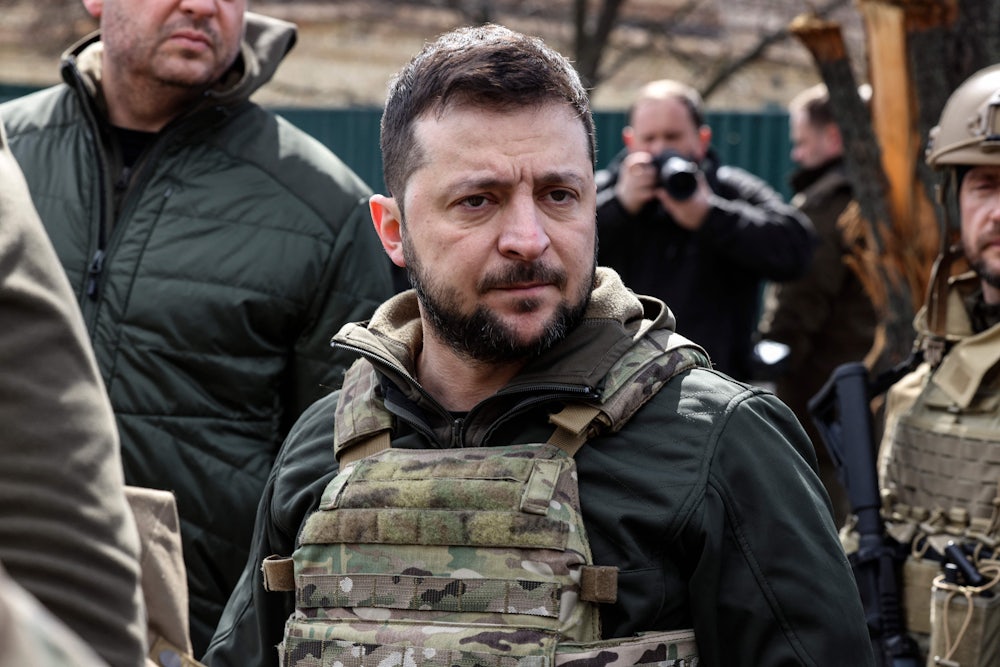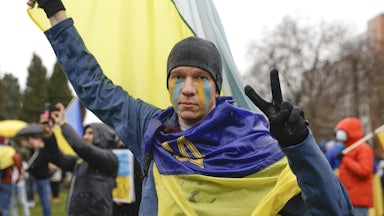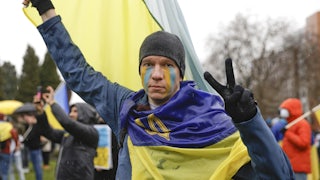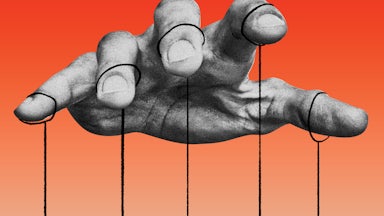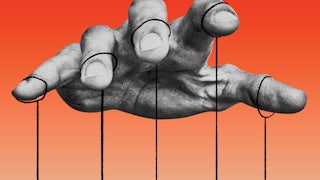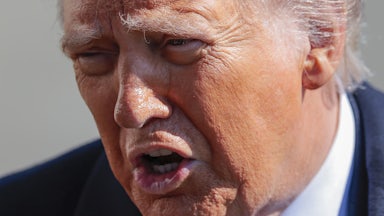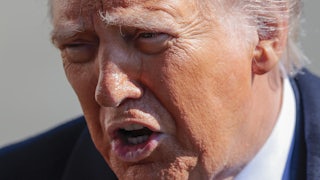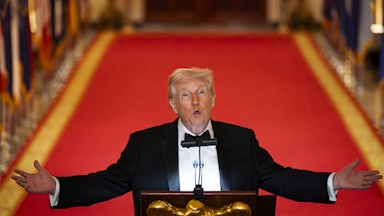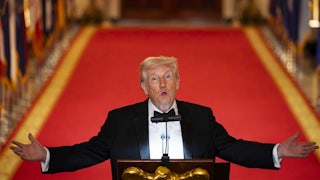After Iraqi leader Saddam Hussein invaded Kuwait in 1990, U.S. President George H.W. Bush’s national-security team met to discuss a possible response. Brent Scowcroft, Bush’s national security adviser, later recalled that the group was lukewarm about protecting Kuwait. Scowcroft, although popularly depicted as a practitioner of realpolitik, wanted to solidify international norms around territorial integrity and peace. “I remember talking to [the president] and said, ‘This is not acceptable. We cannot tolerate this kind of naked aggression,’” Scowcroft recalled.
The desire to punish belligerence—and to subordinate other geopolitical goals to that cause—is once again in the air. The brazenness and brutality of Russia’s invasion of Ukraine has prompted calls for Russia to be severely penalized, lest other countries assault their weaker neighbors. The Atlantic’s Anne Applebaum wrote that if Russia succeeds in conquering Ukraine, “autocrats from Minsk to Caracas to Beijing will take note: Genocide is now allowed” (italics in original). Her colleague Eliot Cohen argued that “Russia’s sheer brutality and utterly unwarranted aggression, compounded by lies at once sinister and ludicrous, have endangered what remains of the global order and the norms of interstate conduct.” He added, “If such behavior leads to humiliation on the battlefield and economic chaos at home, those norms may be rebuilt to some degree.”
Opposing this domino-theory grandiosity is the famed linguist and radical activist Noam Chomsky. In an interview with Current Affairs magazine that has generated much attention, he said that the United States should reject the option of arming Ukraine and instead push for “an ugly settlement,” one that “give[s] Putin and his narrow circle an escape hatch.” That will require accepting some Russian control over the Donbas region and Crimea. That scenario is preferable to Western countries pushing to fight to the last Ukrainian, he said. “That’s the alternative to the destruction of Ukraine and nuclear war,” he said.
In fact, though, there’s another alternative to both the demand that Ukraine surrender and the suggestion that the war should continue so that other despots learn lessons they are unlikely to actually learn. That alternative would be to continue arming Ukrainians to resist Russia while encouraging talks that can help the former end the war on as favorable terms as possible. If the Biden administration pursues that course, it can achieve the difficult task of balancing the need to maintain Ukraine’s freedom with the desire to end the war in the least bloody way.
There is, for once, a striking unanimity among virtually all analysts and officials in developed countries. People who agree on little else are united in opposition to Russia’s invasion, and ordinary citizens are flying the colors of the Ukrainian flag on their cars and in front of their shops in places like Toronto, where I live.
But the consensus dissolves quickly when the discussion progresses about what, exactly, Ukraine should be fighting for. In Foreign Affairs, the political scientist Tanisha Fazal suggests that supporting Ukraine is essential to preserve the progress that has been made in outlawing interstate conquest, which was once a common feature of the international landscape. “Allowing the norm against territorial conquest to wither away would mean taking the lid off territorial disputes around the globe and making millions of civilians more vulnerable to indiscriminate targeting,” he writes. At the State Department, spokesman Ned Price said that “this is a war that is in many ways bigger than Russia, it’s bigger than Ukraine … there are principles that are at stake here that have universal applicability everywhere, whether in Europe, whether in the Indo-Pacific, anywhere in between.”
This line of thinking assumes that leaders around the world observe what happens in one situation and apply it directly to their own. But deciding to attack another country is a complicated calculation, and the anticipated cost from the international community is only one among many factors. After all, in February, Biden warned that the United States and allies would respond “decisively and impose swift and severe costs” on Russia. Russian leader Vladimir Putin decided the invasion would be worth the costs. Similarly, whatever benefits the liberation of Kuwait brought the world in 1991, it didn’t stop Eritrea from invading Ethiopia, prevent other forms of aggression in Yugoslavia or Rwanda, or preclude Al Qaeda from attacking the United States.
There is also the matter of asking Ukrainians to die for something as amorphous as a global principle that may not even be heeded. Joseph Nye, the Harvard professor and former assistant Defense secretary, says via email, “A lot of post-colonial states worry about their sovereignty and territorial integrity and would not like to see the post-1945 norm collapse, but the question is moot because the Ukrainians are fighting for their existence as a state, not about an abstract norm.”
And yet, there are those on the left, such as Chomsky, who imply that the United States should be pressuring Ukraine to abandon their fight. “You can sympathize with [Zelenskiy’s] positions,” he says. “But you can also pay attention to the reality of the world.” In his reality, funneling military supplies to Ukraine is a dead end that only serves to escalate the conflict. Nowhere does he concede that supplying Ukraine with weapons is simply fulfilling Zelenskiy’s pleas. Instead, he suggests that not Russia but “the U.S. is setting things up so as to destroy Ukraine and to lead to a terminal war.” Paleoconservatives say the same thing. “Allied governments have offered abundant weapons to Kyiv and imposed excruciating sanctions on Moscow, all of which serves to keep Ukraine in the war,” writes Doug Bandow of the CATO Institute, ignoring that Volodymyr Zelenskiy has been begging the West for more arms.
But the Ukrainians have performed far better than most analysts expected in the face of overwhelming Russian firepower, and that is partly because those Allied governments have offered abundant weapons. Putin has encountered far more resistance than he expected, his military has suffered far more casualties, and he has been forced to fire generals and even admit mistakes—all of which would be unlikely if Ukraine didn’t have foreign arms. More important, Ukraine has succeeded in pushing Russia to narrow its goals down to conquering the East rather than destroying the entire nation. In some form or another, Ukraine looks poised to survive a showdown with a nuclear-armed state bent on its destruction. It’s a remarkable feat, and it deserves to be applauded.
Chomsky suggests that Ukraine’s position vis-à-vis Russia is akin to humans facing natural disasters. He said: “You may not like the fact that there’s a hurricane coming tomorrow, but you can’t stop it by saying, ‘I don’t like hurricanes’ or ‘I don’t recognize hurricanes.’” Alas, humans have far more capacity to resist foreign armies than to resist hurricanes. For all Russia’s might, its battlefield position is something that can be influenced by Ukraine’s actions—and ours.
Continuing to arm Ukraine need not be at odds with pursuing a negotiated outcome. Ceding any territory to Putin will be excruciating for Ukraine and distasteful for outsiders who wish to punish Russian aggression, but it may be better than endless war and the destruction of people, land, and the global economy. However, Ukraine will be in a far better position during negotiations if it can operate from a situation other than weakness. It is already in a superior spot to where it was, demonstrating far more strength and resilience than outsiders, including Russia, expected.
Ukraine’s diplomats say that Russia is seeking to boost its negotiation power with its latest military offensive, in Mariupol. The United States and its allies can oppose that, or they could encourage Ukraine to immediately accept its fate, as Chomsky recommends. But it still seems that the country’s territory and institutions can perhaps be saved. That, rather than an abstract norm, is worth supporting as long as Ukrainians are willing to fight for it and ask for our help.
